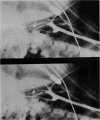Abstract
1. The cerebral circulatory effects of the intracarotid administration of 5-hydroxytryptamine were examined in anaesthetized baboons. Cerebral blood flow was measured by the intracarotid 133Xe technique, cerebral O2 consumption and glucose uptake were measured as indices of brain metabolism and electrocortical activity was continuously monitored. 2. Despite a marked reduction in the calibre of the internal carotid artery (assessed angiographically), the intracarotid infusion of 5-hydroxytryptamine 0-1 microgram/kg. min did not effect any significant changes in cerebral blood flow, O2 consumption or glucose uptake. 3. Following transient osmotic disruption of the blood-brain barrier with the intracarotid infusion of hypertonic urea, the same dose of 5-hydroxytryptamine effected a marked reduction in cerebral blood flow from 51 +/- 2 to 36 +/- 2 ml./100 g. min (mean +/- S.E.; P less than 0-01). Both indices of cerebral metabolism were reduced significantly and the e.e.g. showed a more pronounced suppression-burst pattern. 4. We postulate that the cerebral circulatory responses to 5-hydroxytryptamine are dependent upon the integrity of the blood-brain barrier and the predominant effect of the intravascular administration of 5-hydroxytryptamine is on cortical activity or metabolism, rather than on cerebrovascular smooth muscle.
Full text
PDF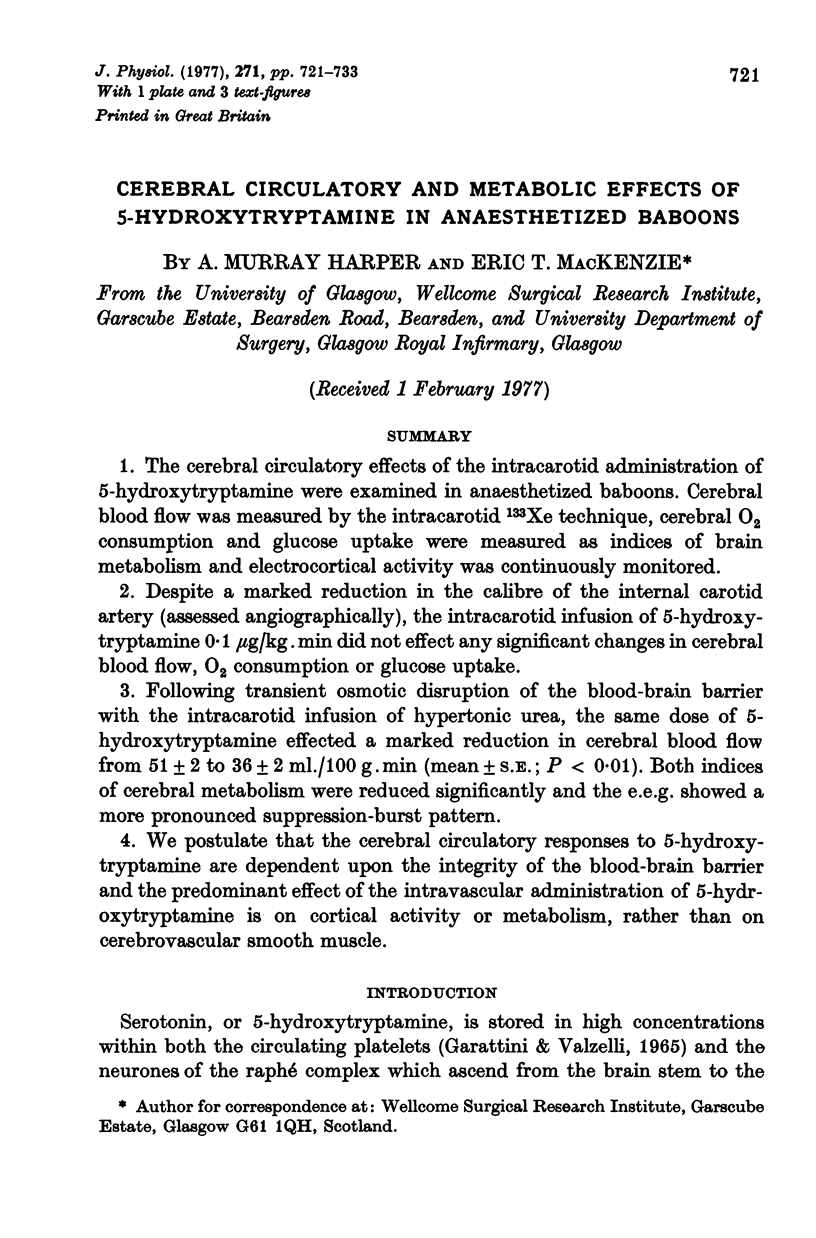
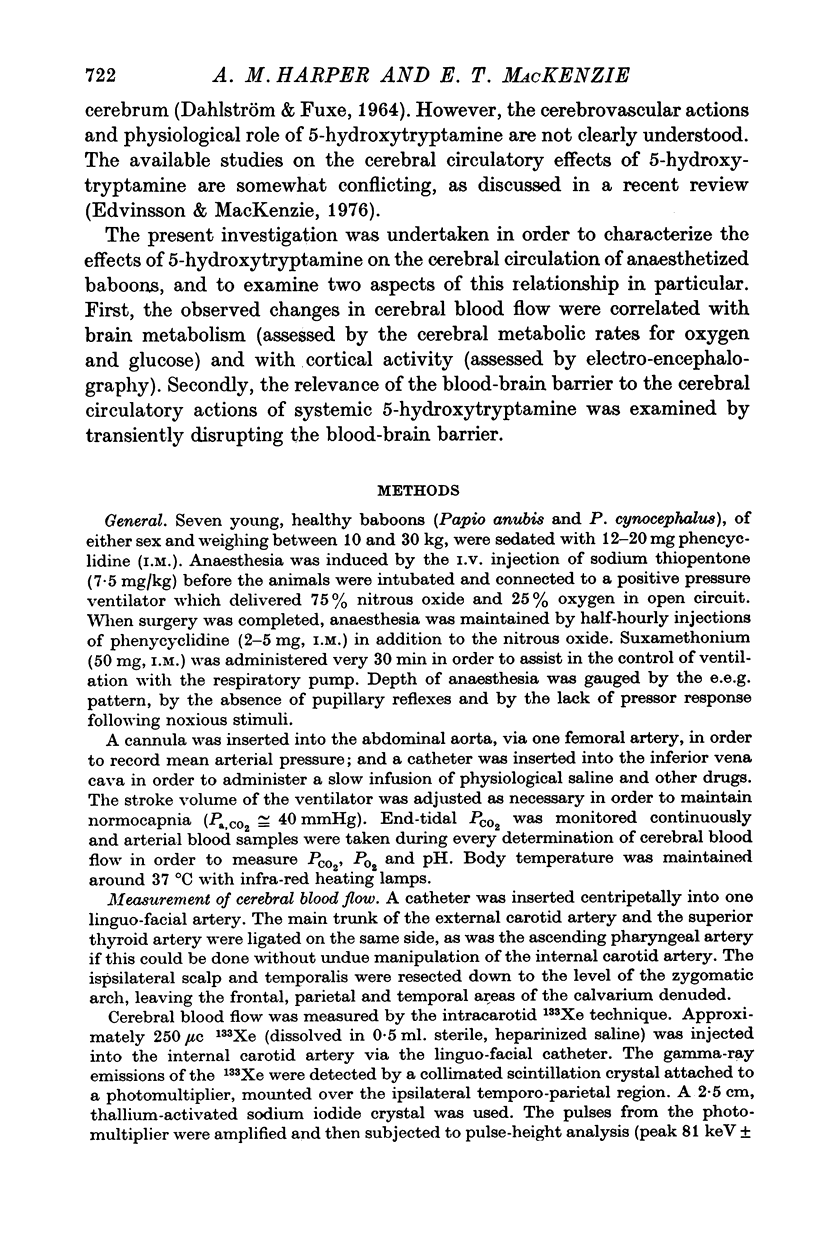
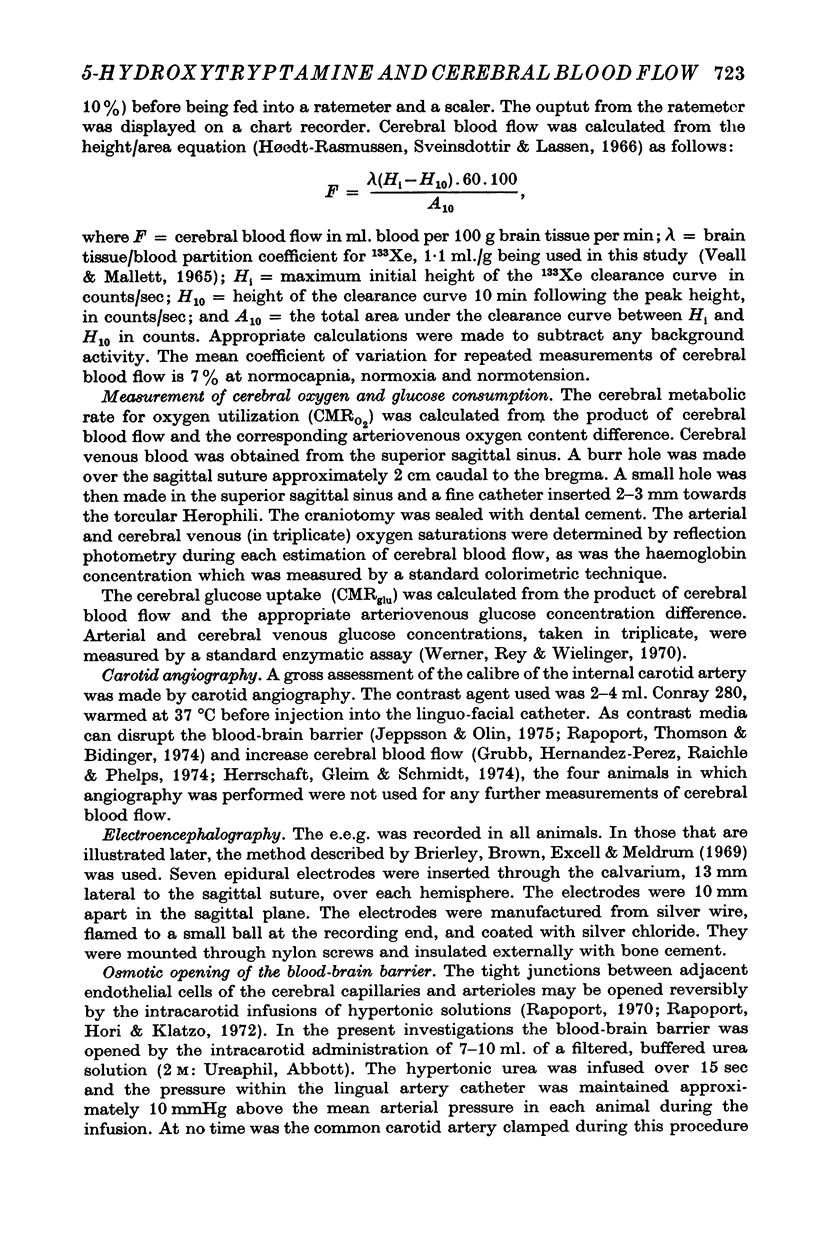
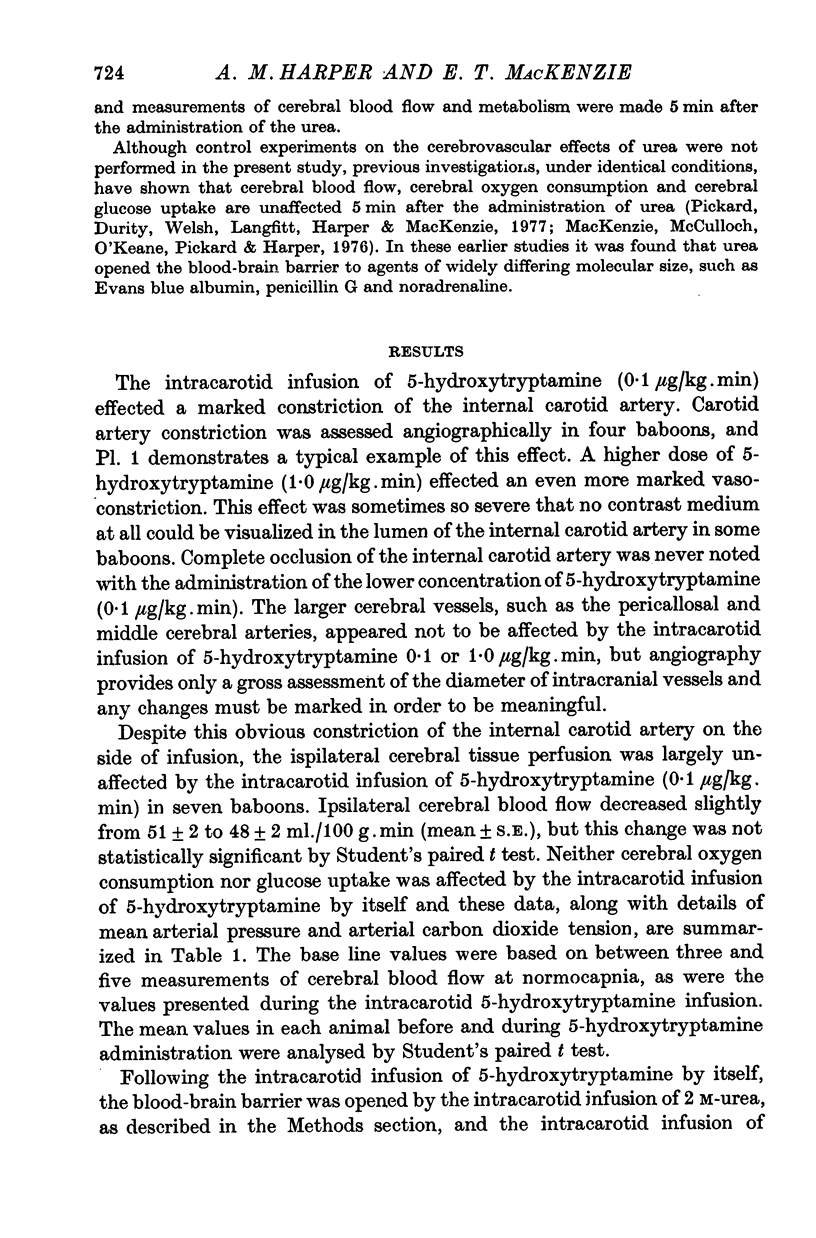
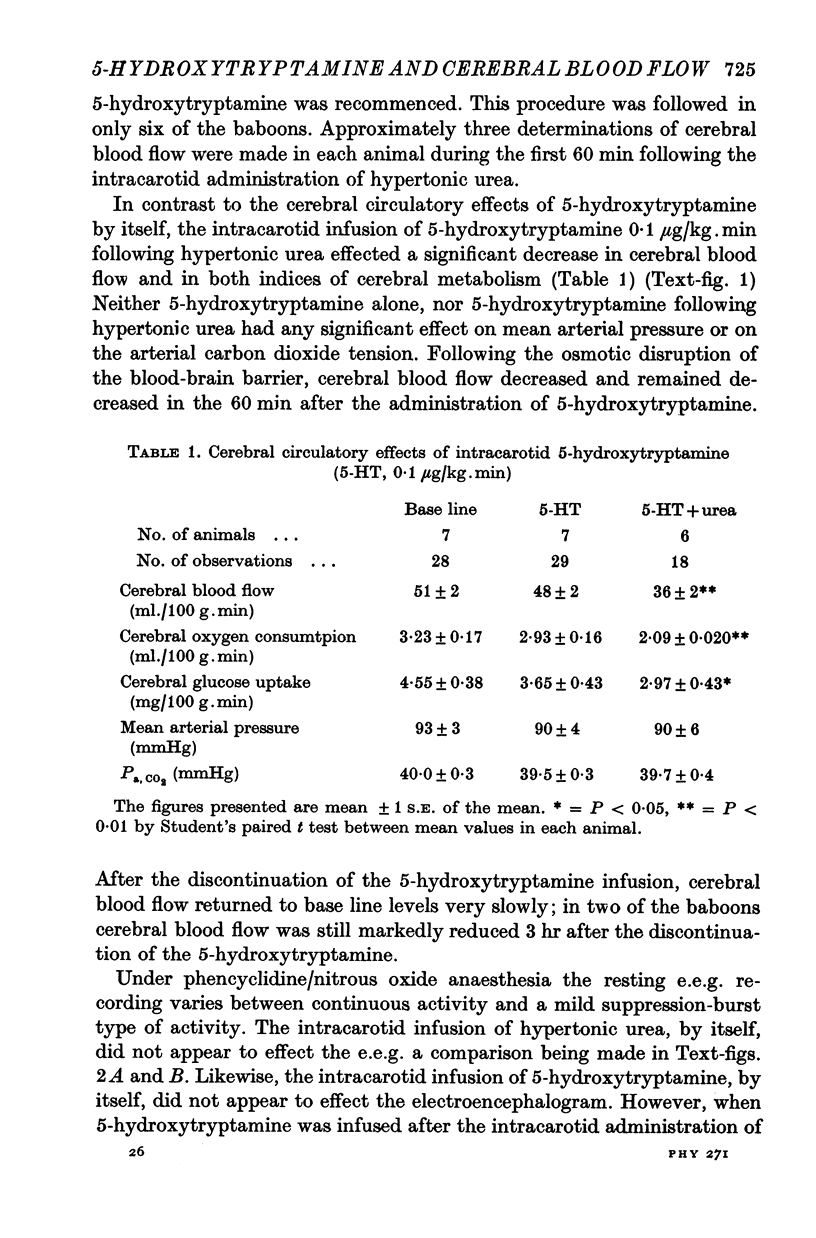
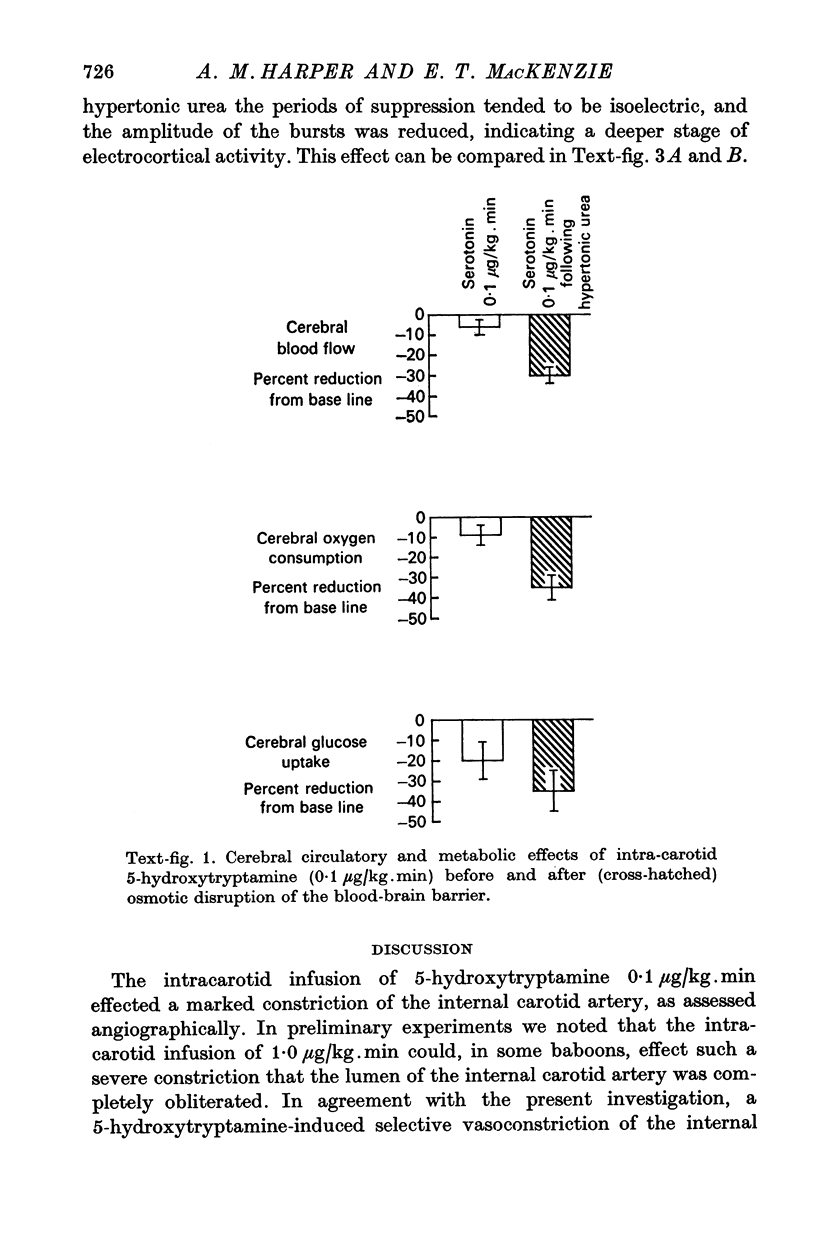
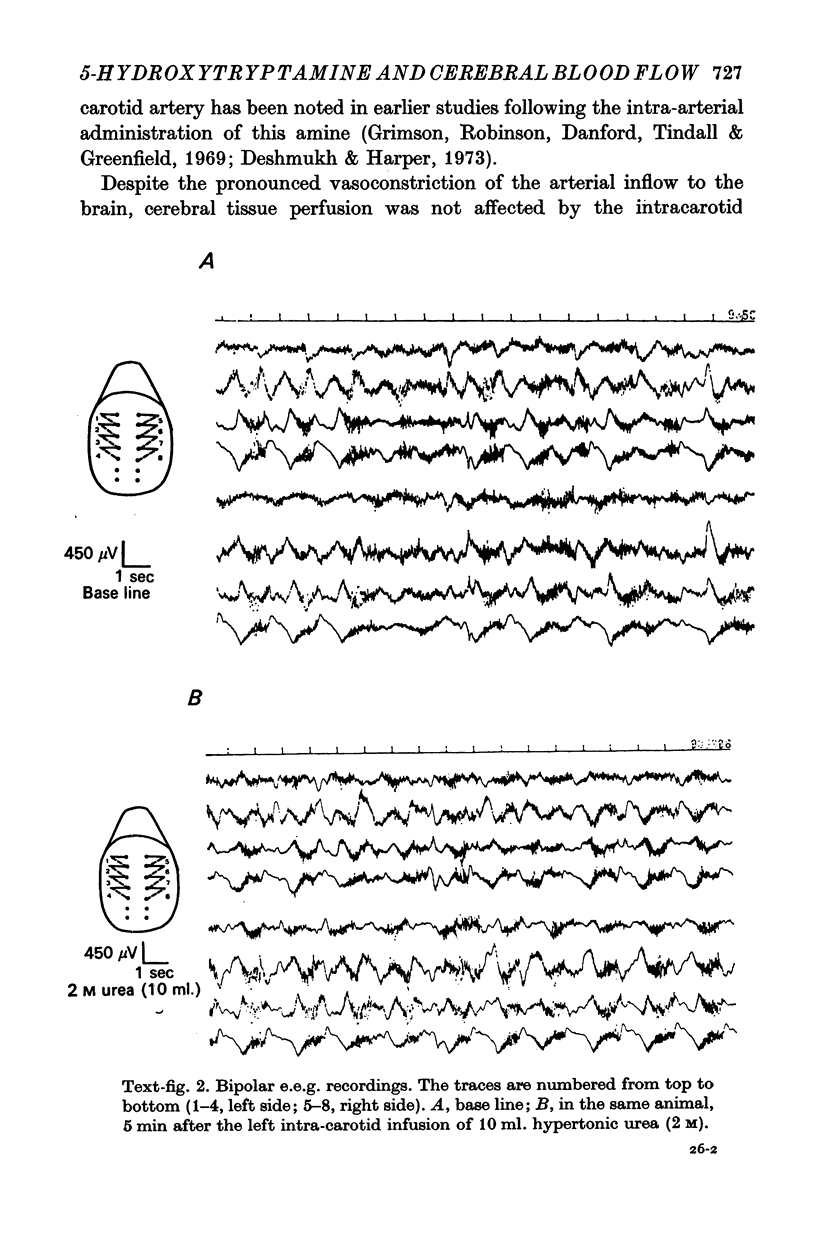
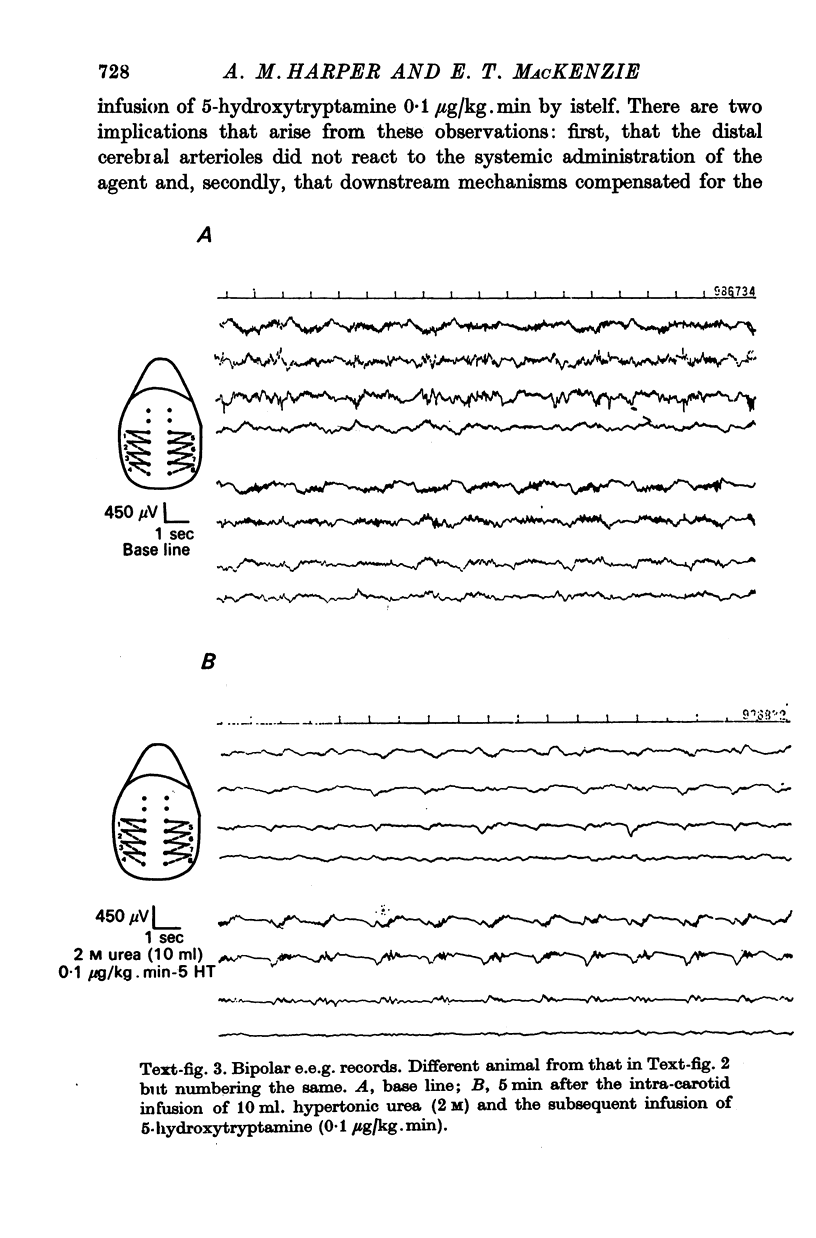
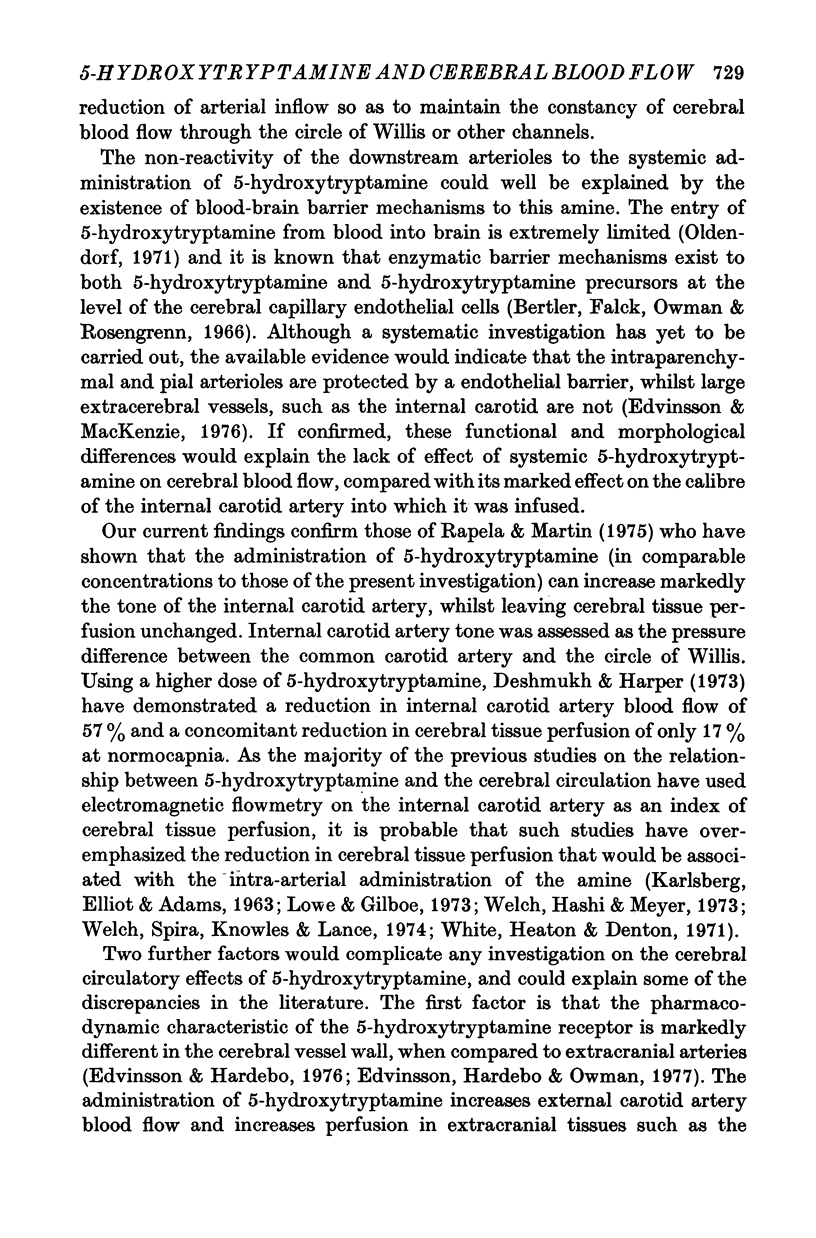
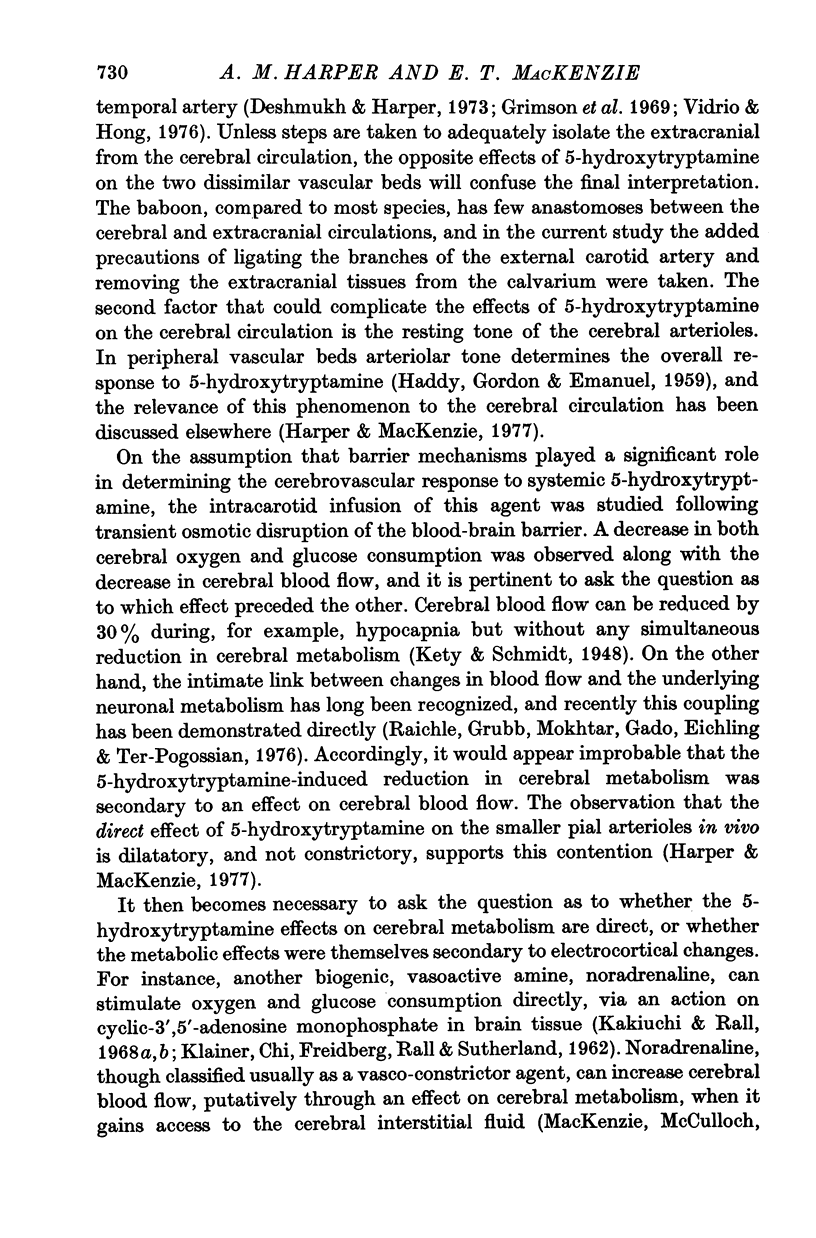
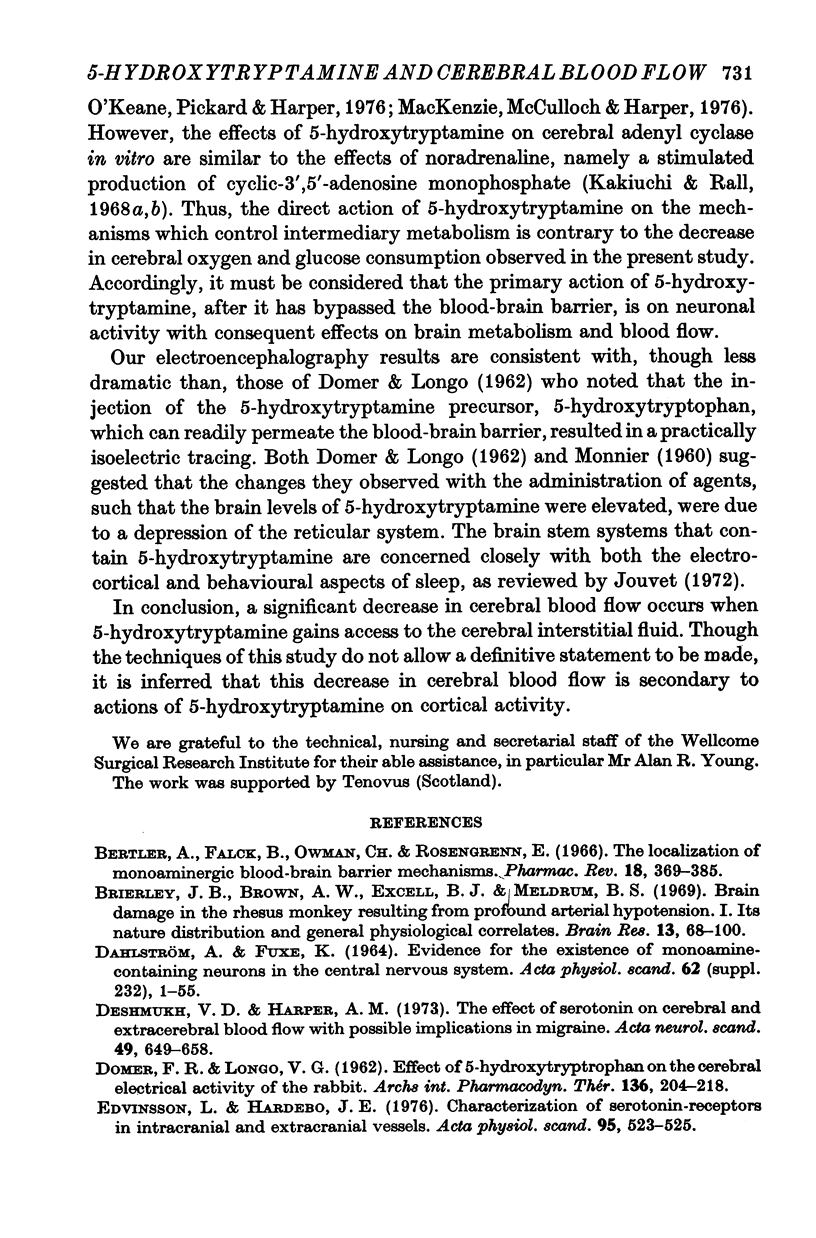
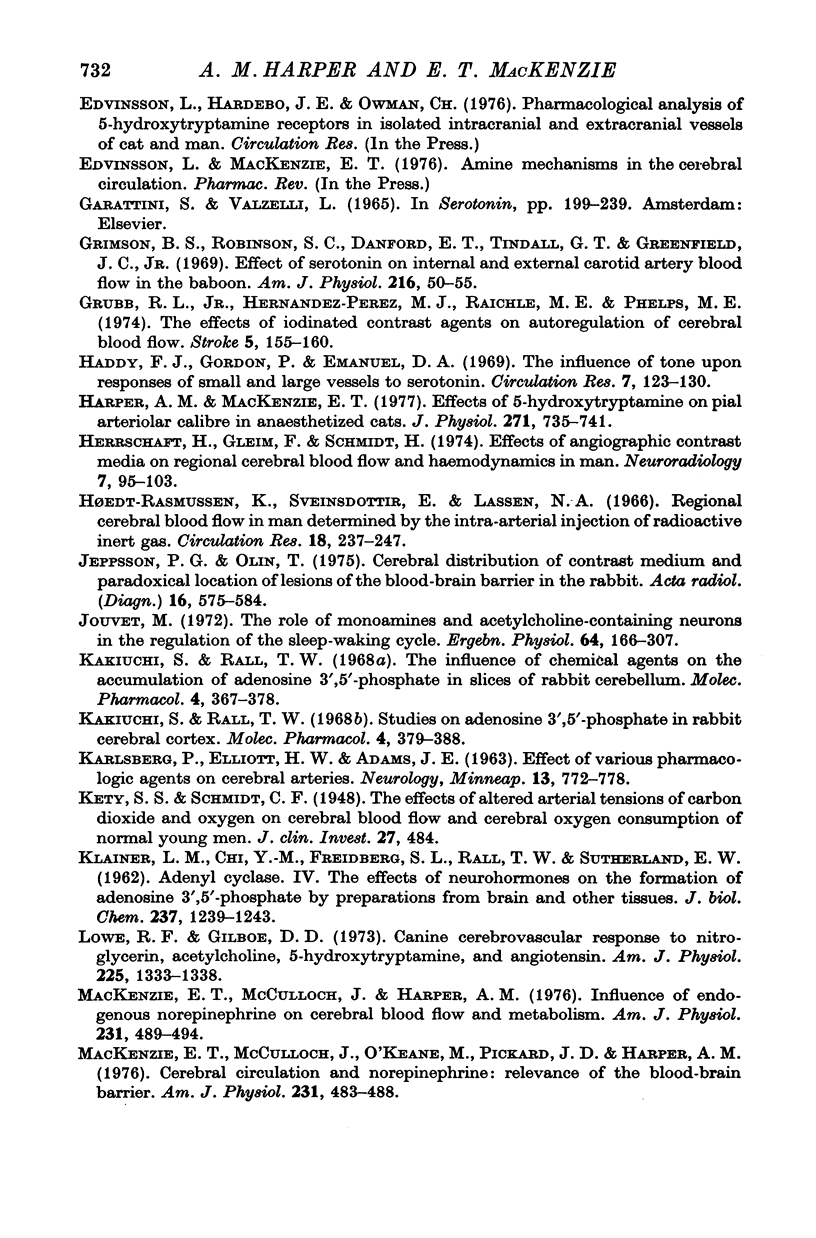
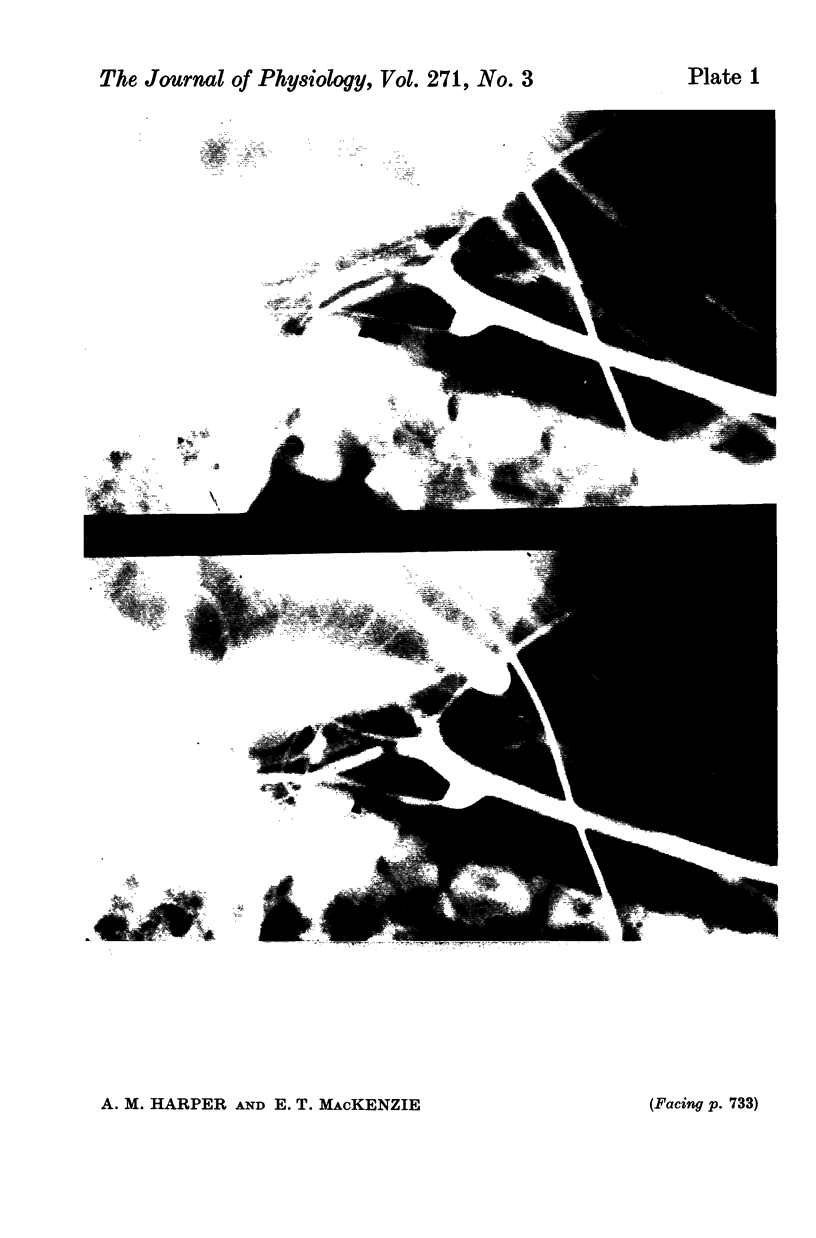
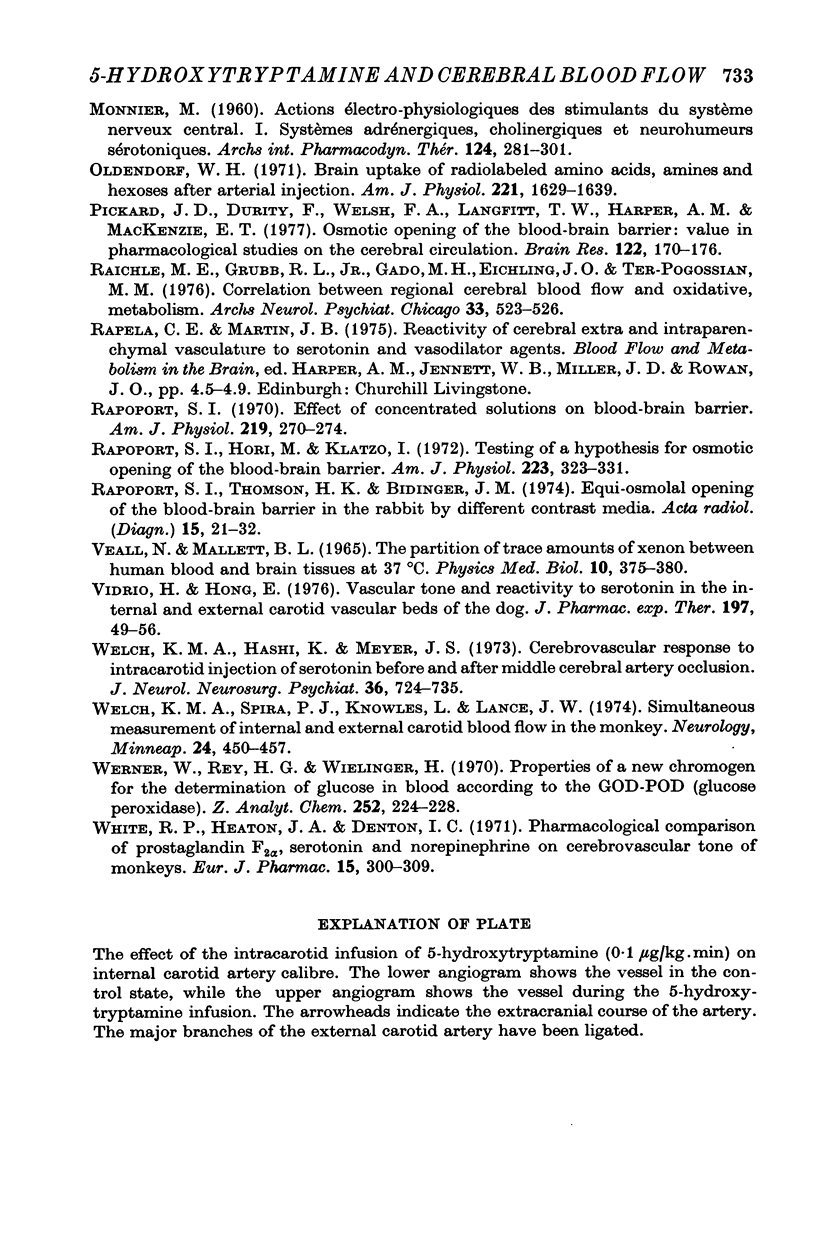
Images in this article
Selected References
These references are in PubMed. This may not be the complete list of references from this article.
- Bertler A., Falck B., Owman C., Rosengrenn E. The localization of monoaminergic blood-brain barrier mechanisms. Pharmacol Rev. 1966 Mar;18(1):369–385. [PubMed] [Google Scholar]
- Brierley J. B., Brown A. W., Excell B. J., Meldrum B. S. Brain damage in the rhesus monkey resulting from profound arterial hypotension. I. Its nature, distribution and general physiological correlates. Brain Res. 1969 Mar;13(1):68–100. doi: 10.1016/0006-8993(69)90144-9. [DOI] [PubMed] [Google Scholar]
- DOMER F. R., LONGO V. G. Effect of 5-hydroxytryptophan on the cerebral electrical activity of the rabbit. Arch Int Pharmacodyn Ther. 1962 Mar 1;136:204–218. [PubMed] [Google Scholar]
- Deshmukh V. D., Harper A. M. The effect of serotonin on cerebral and extracerebral blood flow with possible implications in migraine. Acta Neurol Scand. 1973;49(5):649–658. doi: 10.1111/j.1600-0404.1973.tb01337.x. [DOI] [PubMed] [Google Scholar]
- Edvinsson L., Hardebo J. E. Characterization of serotonin-receptors in intracranial and extracranial vessels. Acta Physiol Scand. 1976 Aug;97(4):523–525. doi: 10.1111/j.1748-1716.1976.tb10293.x. [DOI] [PubMed] [Google Scholar]
- Grimson B. S., Robinson S. C., Danford E. T., Tindall G. T., Greenfield J. C., Jr Effect of serotonin on internal and external carotid artery blood flow in the baboon. Am J Physiol. 1969 Jan;216(1):50–55. doi: 10.1152/ajplegacy.1969.216.1.50. [DOI] [PubMed] [Google Scholar]
- Grubb R. L., Jr, Hernandez-Perez M. J., Raichle M. E., Phelps M. E. The effects of iodinated contrast agents on autoregulation of cerebral blood flow. Stroke. 1974 Mar-Apr;5(2):155–160. doi: 10.1161/01.str.5.2.155. [DOI] [PubMed] [Google Scholar]
- HADDY F. J., GORDON P., EMANUEL D. A. The influence of tone upon responses of small and large vessels to serotonin. Circ Res. 1959 Jan;7(1):123–130. doi: 10.1161/01.res.7.1.123. [DOI] [PubMed] [Google Scholar]
- Harper A. M., MacKenzie E. T. Effects of 5-hydroxytryptamine on pial arteriolar calibre in anaesthetized cats. J Physiol. 1977 Oct;271(3):735–746. doi: 10.1113/jphysiol.1977.sp012023. [DOI] [PMC free article] [PubMed] [Google Scholar]
- Herrschaft H., Gleim F., Schmidt H. Effects of angiographic contrast media on regional cerebral blood flow and haemodynamics in man. Neuroradiology. 1974;7(2):95–103. doi: 10.1007/BF00341877. [DOI] [PubMed] [Google Scholar]
- Hoedt-Rasmussen K., Sveinsdottir E., Lassen N. A. Regional cerebral blood flow in man determined by intra-arterial injection of radioactive inert gas. Circ Res. 1966 Mar;18(3):237–247. doi: 10.1161/01.res.18.3.237. [DOI] [PubMed] [Google Scholar]
- Jeppsson P. G., Olin T. Cerebral distribution of contrast medium and paradoxical location of lesions of the blood-brain barrier in the rabbit. Acta Radiol Diagn (Stockh) 1975 Nov;16(6):577–584. doi: 10.1177/028418517501600605. [DOI] [PubMed] [Google Scholar]
- Jouvet M. The role of monoamines and acetylcholine-containing neurons in the regulation of the sleep-waking cycle. Ergeb Physiol. 1972;64:166–307. doi: 10.1007/3-540-05462-6_2. [DOI] [PubMed] [Google Scholar]
- KARLSBERG P., ELLIOTT H. W., ADAMS J. E. EFFECT OF VARIOUS PHARMACOLOGIC AGENTS ON CEREBRAL ARTERIES. Neurology. 1963 Sep;13:772–778. doi: 10.1212/wnl.13.9.772. [DOI] [PubMed] [Google Scholar]
- KLAINER L. M., CHI Y. M., FREIDBERG S. L., RALL T. W., SUTHERLAND E. W. Adenyl cyclase. IV. The effects of neurohormones on the formation of adenosine 3',5'-phosphate by preparations from brain and other tissues. J Biol Chem. 1962 Apr;237:1239–1243. [PubMed] [Google Scholar]
- Kakiuchi S., Rall T. W. Studies on adenosine 3',5'-phosphate in rabbit cerebral cortex. Mol Pharmacol. 1968 Jul;4(4):379–388. [PubMed] [Google Scholar]
- Kakiuchi S., Rall T. W. The influence of chemical agents on the accumulation of adenosine 3',5'-Phosphate in slices of rabbit cerebellum. Mol Pharmacol. 1968 Jul;4(4):367–378. [PubMed] [Google Scholar]
- Kety S. S., Schmidt C. F. THE EFFECTS OF ALTERED ARTERIAL TENSIONS OF CARBON DIOXIDE AND OXYGEN ON CEREBRAL BLOOD FLOW AND CEREBRAL OXYGEN CONSUMPTION OF NORMAL YOUNG MEN. J Clin Invest. 1948 Jul;27(4):484–492. doi: 10.1172/JCI101995. [DOI] [PMC free article] [PubMed] [Google Scholar]
- Lowe R. F., Gilboe D. D. Canine cerebrovascular response to nitroglycerin, acetylcholine, 5-hydroxytryptamine, and angiotensin. Am J Physiol. 1973 Dec;225(6):1333–1338. doi: 10.1152/ajplegacy.1973.225.6.1333. [DOI] [PubMed] [Google Scholar]
- MacKenzie E. T., McCulloch J., Harper A. M. Influence of endogenous norepinephrine on cerebral blood flow and metabolism. Am J Physiol. 1976 Aug;231(2):489–494. doi: 10.1152/ajplegacy.1976.231.2.489. [DOI] [PubMed] [Google Scholar]
- MacKenzie E. T., McCulloch J., O'Kean M., Pickard J. D., Harper A. M. Cerebral circulation and norepinephrine: relevance of the blood-brain barrier. Am J Physiol. 1976 Aug;231(2):483–488. doi: 10.1152/ajplegacy.1976.231.2.483. [DOI] [PubMed] [Google Scholar]
- Oldendorf W. H. Brain uptake of radiolabeled amino acids, amines, and hexoses after arterial injection. Am J Physiol. 1971 Dec;221(6):1629–1639. doi: 10.1152/ajplegacy.1971.221.6.1629. [DOI] [PubMed] [Google Scholar]
- Pickard J. D., Durity F., Welsh F. A., Langfitt T. W., Harper A. M., MacKenzie E. T. Osmotic opening of the blood-brain barrier: value in pharmacological studies on the cerebral circulation. Brain Res. 1977 Feb 11;122(1):170–176. doi: 10.1016/0006-8993(77)90676-x. [DOI] [PubMed] [Google Scholar]
- Raichle M. E., Grubb R. L., Jr, Gado M. H., Eichling J. O., Ter-Pogossian M. M. Correlation between regional cerebral blood flow and oxidative metabolism. In vivo studies in man. Arch Neurol. 1976 Aug;33(8):523–526. doi: 10.1001/archneur.1976.00500080001001. [DOI] [PubMed] [Google Scholar]
- Rapoport S. I. Effect of concentrated solutions on blood-brain barrier. Am J Physiol. 1970 Jul;219(1):270–274. doi: 10.1152/ajplegacy.1970.219.1.270. [DOI] [PubMed] [Google Scholar]
- Rapoport S. I., Hori M., Klatzo I. Testing of a hypothesis for osmotic opening of the blood-brain barrier. Am J Physiol. 1972 Aug;223(2):323–331. doi: 10.1152/ajplegacy.1972.223.2.323. [DOI] [PubMed] [Google Scholar]
- Rapoport S. I., Thompson H. K., Bidinger J. M. Equi-osmolal opening of the blood-brain barrier in the rabbit by different contrast media. Acta Radiol Diagn (Stockh) 1974 Jan;15(1):21–32. doi: 10.1177/028418517401500103. [DOI] [PubMed] [Google Scholar]
- Vidrio H., Hong E. Vascular tone and reactivity to serotonin in the internal and external carotid vascular beds of the dog. J Pharmacol Exp Ther. 1976 Apr;197(1):49–56. [PubMed] [Google Scholar]
- Welch K. M., Hashi K., Meyer J. S. Cerebrovascular response to intracarotid injection of serotonin before and after middle cerebral artery occlusion. J Neurol Neurosurg Psychiatry. 1973 Oct;36(5):724–735. doi: 10.1136/jnnp.36.5.724. [DOI] [PMC free article] [PubMed] [Google Scholar]
- Welch K. M., Spira P. J., Knowles L., Lance J. W. Simultaneous measurement of internal and external carotid blood flow in the monkey. An approach to the study of migraine mechanisms. Neurology. 1974 May;24(5):450–457. doi: 10.1212/wnl.24.5.450. [DOI] [PubMed] [Google Scholar]
- White R. P., Heaton J. A., Denton I. C. Pharmacological comparison of prostaglandin F 2a' serotonin and norepinephrine on cerebrovascular tone of monkey. Eur J Pharmacol. 1971;15(3):300–309. doi: 10.1016/0014-2999(71)90096-3. [DOI] [PubMed] [Google Scholar]



